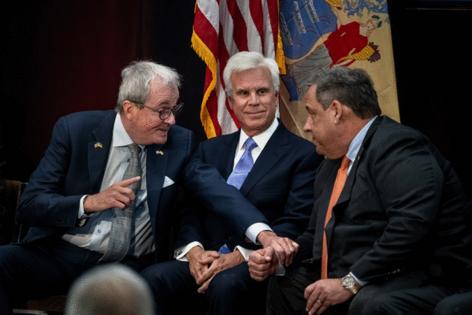Norcross group buys more bank shares
Published in Business News
An investors’ group headed by George Norcross, a South Jersey political leader, developer, and Cooper University Health Care chairman, has bought more shares in Mid Penn Bancorp, a sign of confidence in the regional economy even as U.S. bank shares slip amid economic turbulence.
General American Capital, an investment company backed by the Norcross family and managed by longtime Norcross employee Susan Hudson with help from Norcross’ brother Philip, bought around 221,000 shares of Mid Penn for $6.3 million between Jan. 7 and April 1, according to this SEC filing.
The latest investment brings the Norcross group’s Mid Penn holdings to 1.4 million shares, or 7.3% of the bank, which is based in Harrisburg. The group said last fall that it was buying into Mid Penn as an investment.
Unlike with its earlier, activist investment in the former Republic Bank of Philadelphia, now part of Fulton Bank, the Norcross group said it did not plan to try to change Mid Penn’s management team, board composition, or business focus.
George Norcross’ son, Alex, joined Mid Penn last year as an assistant vice president for private banking, serving wealthy clients in the Philadelphia area.
Mid Penn, based in Harrisburg, has more than 40 branches in south-central and eastern Pennsylvania and central New Jersey. In recent years it has focused on small-business banking and has expanded into the Philadelphia area.
The bank on April 2 said shareholders of both banks had approved its planned purchase of William Penn Bank and its 12 branches in Bucks and Montgomery Counties by near-unanimous votes.
Mid Penn shares slipped from $28 on Jan. 7 to $24 as of Tuesday, partly recovering Wednesday following President Donald Trump’s suspension of most of his planned new tariffs, which are taxes on U.S. imports. The stock closed down 3.94% on Thursday.
Financial uncertainty is affecting banks
Long-term interest rates have headed higher due to uncertainty over U.S. tariff and tax plans. High interest rates tend to depress U.S. business activity, though they can also boost banks’ profit margins if the economy continues growing.
Even before the tariff announcements, business lending had slowed down in recent months, Robert Curley III, regional president of TD Bank in the Philadelphia area, said in a recent interview.
“There’s been a general slowdown since the election, which I think was counter to what people expected,” though small-business lending held up better than loans to larger companies, Curley added.
“Everybody expected inflation and interest rates to drop immediately after the election. It didn’t happen,” he said. “Then we were waiting on the tariffs. There’s still a feeling, when interest rates and inflation drop, we’ll get back to growing again.”
Meanwhile, “the high uncertainty driven by the tariffs … make it near-impossible for business planning,” warned Ed Mills, Washington-based policy analyst for Raymond James & Associates, an investment bank whose focus includes commercial banking stocks, in a report to clients Thursday.
With the threat of higher materials costs from import taxes looming, banks are likely to lend less and set aside more in reserves, Raymond James bank analyst Michael Rose said.
_____
©2025 The Philadelphia Inquirer, LLC. Visit at inquirer.com. Distributed by Tribune Content Agency, LLC.












Comments